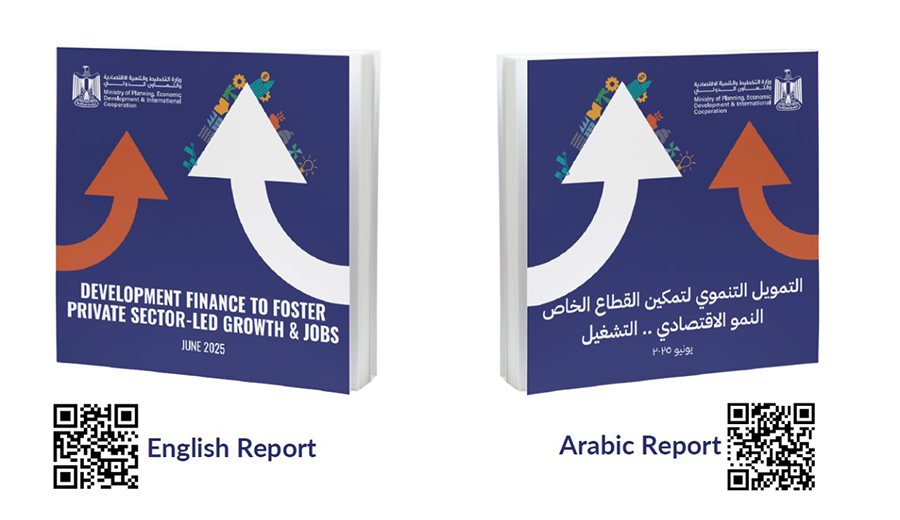Ministry of Planning, Economic Development and International Cooperation Launches Report "Development Finance to Foster Private Sector-Led Growth & Jobs”

15 June 2025
$15.6 billion in development financing from development partners for domestic and foreign private sectors from January 2020 to May 2025.
Over 30 bilateral and multilateral development partners provide direct and indirect financing mechanisms for the private sector in Egypt.
The European Bank for Reconstruction and Development (EBRD) leads private sector financing with 22%, followed by the European Investment Bank (EIB).
Report reviews direct and indirect mechanisms that benefited the private sector over 5 years.
The Ministry of Planning, Economic Development and International
Cooperation launched the report "Development Finance to Foster Private
Sector-Led Growth & Jobs” during a conference held by the Ministry under
the patronage and in the presence of Prime Minister H.E. Dr. Mostafa Madbouly.
The event saw participation from a number of ministers, development partners,
the European Union in Egypt, international institutions, and private sector
representatives. The conference aims to review the direct and indirect
financing mechanisms provided by development partners to the local and foreign
private sectors over the past five years.
H.E. Dr. Rania Al-Mashat, Minister of Planning, Economic Development and
International Cooperation, emphasized that promoting private sector
participation is no longer an option but a strategic necessity for creating a
resilient economy, achieving sustainable economic growth, and increasing
employment rates. In light of global financing challenges, development finance
represents a vital tool to bridge the financing gap facing development efforts
by providing development financing resources, technical expertise, and
innovative mechanisms that contribute to reducing investment risks, especially
in priority sectors.
H.E. Al-Mashat also affirmed that the state's continued development of
institutional coordination mechanisms, enhanced transparency, and building
effective partnerships with development partners will drive more qualitative
projects that create job opportunities, contribute to localizing development,
and achieve a comprehensive and sustainable economic transformation. Empowering
the private sector through development finance is not only an investment in the
economy but a direct investment in the future.
The report indicates that since 2020, the private sector has witnessed
significant development in its relationships with multilateral and bilateral
development partners, stemming from the state's commitment to advancing its
role in development efforts as a key driver of inclusive growth, job creation,
and achieving sustainable development goals. The development financing
portfolio directed towards the private sector has seen remarkable growth in
recent years, exceeding $4.2 billion in 2024, surpassing for the first time
development financing directed towards the government sector. This reflects the
increasing shift in the focus of development partners towards supporting
private sector investments and enhancing its contribution to achieving
sustainable development goals.
The report showed that during the period from January to May 2025, the volume
of financing reached $1.14 billion, which reinforces expectations of this
momentum continuing. The total financing provided to the private sector during
the period from 2020 to May 2025 amounted to approximately $15.6 billion from
more than 30 development partners, reflecting the growing international
confidence in the Egyptian investment climate and the increasing role of the
private sector in driving development.
Regarding international partners, the report highlighted that the number
of bilateral and multilateral development partners supporting the Egyptian
private sector since 2020 has exceeded 30 entities. This diversity is reflected
in the qualitative variety of tools provided by these partners to the private
sector and also reflects strong confidence in the stability of the Egyptian
economy and its growth prospects.
The European Bank for Reconstruction and Development (EBRD) topped the
list of development partners with a financing share representing 22% of total
development financing, followed by the European Investment Bank (EIB) with an
equivalent of 21%. This reflects the pivotal role of European development
partners, both multilateral and bilateral, in financing infrastructure and
supporting the capabilities of the private sector in Egypt, who together
account for approximately 47% of the value of development financing directed to
the private sector in Egypt since 2020, with a contribution equivalent to
approximately $7.3 billion.
The International Finance Corporation (IFC) came in third place with
approximately 19%, a clear indication of the trend towards supporting small and
medium-sized enterprises and enhancing direct investment.
The report addressed ways to empower the private sector through an
integrated system that includes improving the business environment, supporting
its competitiveness, developing its institutional capabilities, in addition to
facilitating its access to various financing tools, whether in the form of
development financing, equity partnerships, or technical support tailored to
the needs of each sector. The importance of these endeavors lies in not only
increasing financing but also in enhancing the efficiency of use and promoting
the developmental impact of projects, in line with Egypt's Vision 2030.
The report focused on the green transformation, digital economy,
entrepreneurship, and inclusive growth as fundamental pillars for the next
phase, consistent with the state's priorities. This is done by linking these
pillars with international cooperation frameworks to ensure resources are
directed towards areas that achieve long-term added value. This emphasizes the
importance of formulating development financing strategies based on clear
national priorities, characterized by flexibility and the ability to respond to
the changing needs of the private sector.
To obtain the report, please use the following link: https://moic.gov.eg/ar/news/2291









